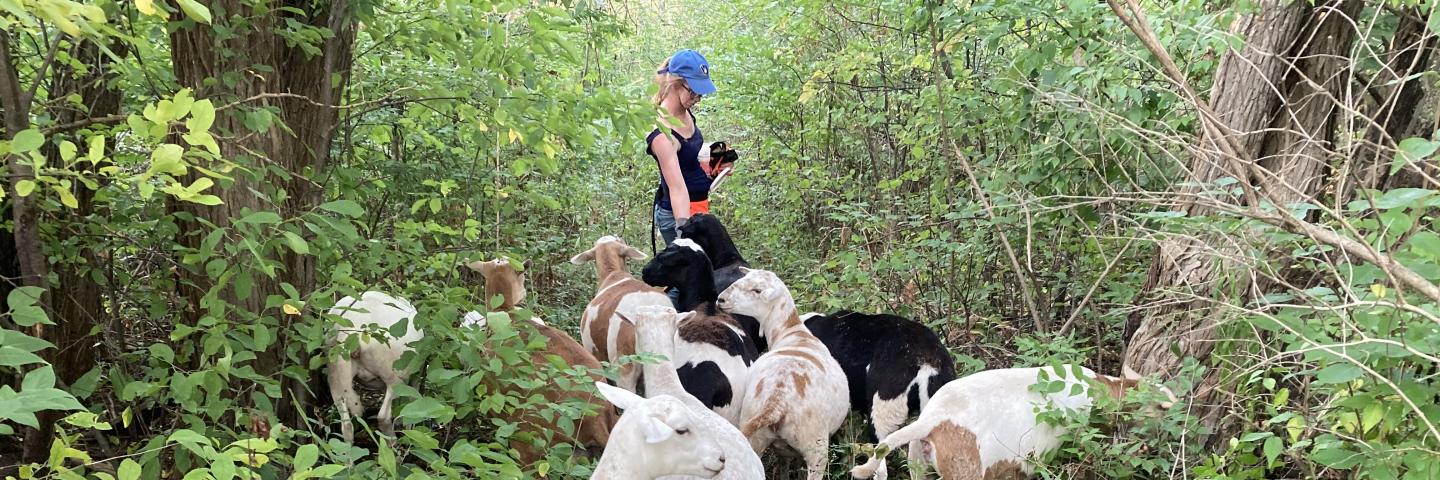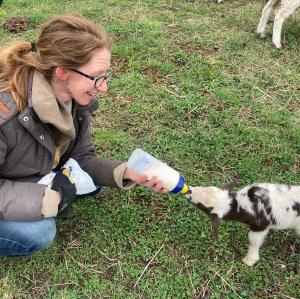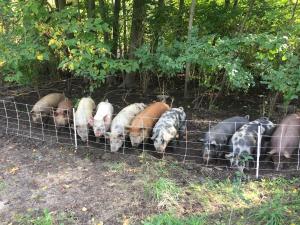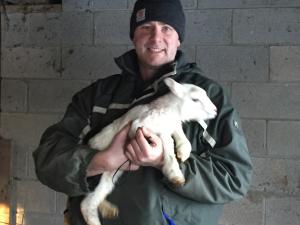
Meet Josh & Tiffany Kriner from Marengo, IL. They transformed depleted cropland into a grazing oasis that meets everyone's needs.
JOSH & TIFFANY KRINER
Root & Sky Farms-Marengo, IL
Overview
Josh Kriner’s initial interest in farming and livestock came from a passion for making cheese. While most cheesemakers stick to coagulating, salting, and shaping cheese, Josh began to consider how he might get into the milk production side of things through raising livestock. Fast forward a few years, and after careful planning, research, and hands-on training, Josh and his wife Tiffany raise six different species of livestock and manage 60 acres of land on the outskirts of Marengo, in McHenry County, Illinois.

Their operation, called Root and Sky Farm, was formerly tended by the renowned 19th century beekeeper and musician, C. C. Miller. At one time, Miller was the largest producer of comb honey in North America. Josh and Tiffany keep Miller’s tradition of stewardship alive, raising livestock and carefully managing the land’s pastures and woodlands.
Grazing Management
Root and Sky Farm is divided into two parcels, 37 acres of walnut-dominated woodland and 20 acres of pasture. The woodland provides forage and shade to the farm’s pigs and sheep, which are rotated through plots over the course of the season. Josh notes that this shaded habitat offers increased comfort for the pigs during the hot, humid summers.
The sheep also thrive in the woodland, eating honeysuckle and gooseberry. The dominant tree species in the woodland is currently black walnut, which grows aggressively and is allelopathic. Josh’s goal is to convert the woodland acres into a less dense oak savanna by managing invasive species and planting trees, grass, and shrubs.
A managed oak savanna system would both facilitate grazing and enable easier navigation for Josh as he monitors and waters the animals. Both the pigs and the sheep play an important role in this management, clearing out the understory by consuming herbaceous species.
After years of intensive row-cropping, the soils of the farm’s tillable acres were depleted and lacking in organic matter. When Tiffany and Josh purchased the property, they began the process of converting those acres to perennial pasture. Josh now practices Managed Intensive Rotational Grazing (MIRG) in the pasture, rotating cattle and sheep through spring, summer, and fall.

Josh also raises laying hens, broilers, and turkeys on pasture, which improves the quality of the meat and adds needed fertility to the soil. After just a year of careful stewardship, the Kriners began to see grassland birds, amphibians, and insects return to their land.
Josh is exploring various options for additional financial support for the farm. Like many parcels of farmland in Illinois, Root and Sky Farm no longer has perimeter fencing in place. Installing perimeter fencing is a priority for Josh, and he recently received a grant from the Frontera Farmer Foundation for electric perimeter fencing.
Another source of funding for certain types of grazing infrastructure is the Natural Resources Conservation Service (NRCS), which includes working lands programs like the Environmental Quality Incentives Program (EQIP) and the Conservation Stewardship Program (CSP). Both programs include specific funding pools for grazing practices.
Processing & Market Development
Processing continues to be a challenge, particularly during the COVID-19 pandemic; what was typically a two to three month wait for processing appointments stretched out to eight or nine months. At one point, Josh had to drive his livestock across the state to a facility outside of St. Louis. Even before the pandemic, options for USDA-inspected facilities locally were very limited. Josh uses Eickmann’s Processing Co. which is located just under an hour away in Seward, Illinois.

Josh sells meat direct-to-consumer, primarily at the Woodstock Farmers’ Market, although he does some delivery and on-farm pick-up sales. Demand for Root and Sky Farm products has largely spread through word of mouth; customers can taste the difference between the pasture-raised products and meat produced conventionally. Josh has been approached by restaurants but doesn’t yet have the necessary volume to supply them. Restaurants also generally want a lower price point, and so far, direct-to-consumer sales at the farmers’ market have been good business.
Diversifying Farm Enterprises
Josh plans to further diversify Root and Sky Farm with the addition of a permaculture orchard in the summer of 2022, starting with about an acre of land where Josh will plant numerous species of fruit trees and shrubs. The diversity of a permaculture orchard leads to increased resilience, reducing the incidence of pests and disease. Josh also hasn’t given up on dairy and cheese. Dairy requires a significant initial financial investment, but Josh hopes to eventually add dairy production as an additional enterprise at Root and Sky Farm.
In addition to strengthening the environmental and economic resilience of the farm, diversifying farm enterprises builds social resilience. Josh describes his vision for farm dinners, where the community can come together to enjoy the wide range of products produced on the farm. Building relationships with customers is a crucial part of growing and sustaining the business.
Josh is very open with aspiring farmers, sharing details about his operation, and providing sound advice. He tries to provide a realistic portrait of running a farm, emphasizing both how challenging and rewarding the work can be. What’s clear to Josh is that regenerative farming and stewardship is the right fit for him, his family, and their land.
To learn more about Root and Sky Farm, check out their website.

